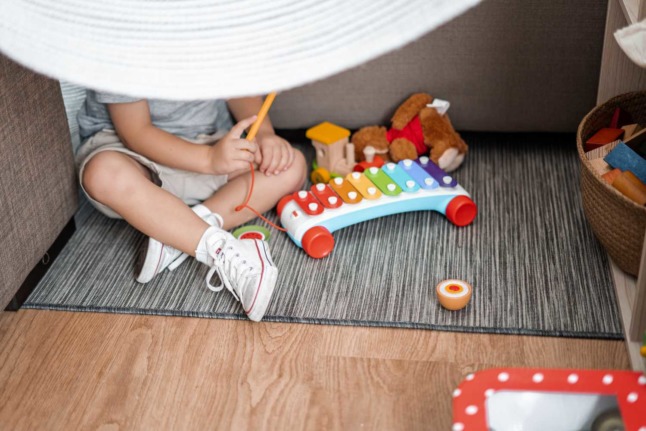What you should know if you want to become an au pair in Switzerland

Thinking of working for a Swiss family as an au pair? From contracts to the length of stay, here are 10 tips to consider before you embark on an Alpine work adventure.
Working as an au pair in Switzerland can be an amazing life experience to learn all about another culture, build language skills and earn money.
But to ensure it all goes smoothly - and so you get to enjoy the Swiss Alpine views often instead of worrying about your employment or losing money - you should keep a few things in mind.
Here are 10 tips to consider when you want to become an au pair in Switzerland.
1. Sign an au-pair contract
If you want to work as an au pair in Switzerland, the first step is to check you qualify (more on that below) and to look for a suitable host family. The best way to do this is to use the services of one of the numerous au pair placement agencies, such as this one. Once you've found a suitable placement, you and your host family should sign an agreement.
The au pair contract should contain all the essential details: there should be detailed information on the duration of your stay, working hours and holidays, type of accommodation, language courses and pocket money (called "Sackgeld" in Switzerland).
The cantonal "Normalarbeitsvertrag für hauswirtschaftliche Arbeitnehmer" (standard employment contract for domestic workers) is a must for your employment conditions as an au pair. One copy goes to the host family, one to the labour market authority and one to you as the au pair.
Moneyland.ch points out that a permit also has to be approved by both the canton and federal authorities before employment can start.
"A permit can take a good two months," said the advice website, adding that people should apply as early as possible.
READ ALSO: The pros and cons of working as an au pair in Switzerland
2. Keep an eye on insurance
Employment as an au pair is the equivalent to a regular employment relationship. As an au pair, you are obliged to pay social insurance contributions (AHV, IV, EO, ALV) from the age of 18 and must pay half of the costs incurred. These social security contributions are automatically deducted from your au pair's salary - whereby the sum of pocket money and wages in-kind serves as the basis for calculation here. In order for this to be possible, your host family must apply for an insurance certificate from the social security office of the canton of residence.
When it comes to accident insurance, your host family has to pay for the so-called company accident insurance (BU), while the non-company accident insurance (NBU) is covered by you as an au pair. However, it is also possible that the host family will voluntarily pay the NBU premiums for you. Check all this out so you have an idea of what to expect.
READ ALSO: How to understand your Swiss payslip
 Many people choose to become an au pair in Switzerland. Photo by Kelli McClintock on Unsplash
Many people choose to become an au pair in Switzerland. Photo by Kelli McClintock on Unsplash
3. Take out health insurance
For stays of three months or longer, you must be insured with a Swiss health insurance company or an equivalent alternative. At least half of the health insurance premiums must be financed by the host family. You can find reasonably priced basic health insurance on comparison websites to grab a good deal.
You should also check out alternative health insurance cover that is available for students if you are studying. These are often much cheaper than standard health insurance.
4. Don't stay too long
An au pair can generally stay in Switzerland for up to 12 months. Au pairs from EU and EFTA countries can extend their stay to a maximum of 24 months. There are also restrictions regarding age: Au pairs from EU and EFTA countries have to be between 17 and 30 years old. For all other countries, the maximum age is 25.
5. Discuss your work tasks in advance
As a live-in nanny, your main task will be taking care of the children. You can also help out in the host parents' household, however, you are only allowed to do light housework. In return, as an au pair you are entitled to free board and lodging, in the form of your own room, and pocket money. In order to avoid any misunderstandings, you should discuss your role and tasks with your future host family in advance.
6. Check the pocket money allowance
In Switzerland, au pairs are paid pocket money ("Sackgeld") as well as a lump sum in the form of board and lodging. The pocket money depends on age and canton and is usually between 500 and 800 Swiss francs per month. If au pairs fall ill or have an accident, they are entitled to still receive payment. This also applies to holidays and public holidays.
7. Complete a language course
As an au pair you have to complete a language course in the language of your place of residence. German is the main language in German-speaking Switzerland, French in French-speaking Switzerland and Italian in Ticino. For a stay of one year, a language course must be at least 120 hours, i.e. three hours per week. Your host family has to pay for the course fees.
You can get to the language course either by public transport at the host family's expense or by car, which should be driven by one of your hosts or they can let you drive (if you have a valid driving licence).

8. Don't work too much
As an au pair, you are allowed to work a maximum of 30 hours per week. The working hours must be arranged so that you can take that language course. Plus the host family have to give you at least one day off per week.
The holiday entitlement depends on your age. Au pairs are entitled to five weeks of holiday per year up to the age of 20, and four weeks of holiday after that. Working on holidays is only allowed in exceptional cases.
9. Think about your bank accounts
If it's a shorter stay, it's not absolutely necessary to open a Swiss bank account. You don't need a Swiss credit card either. You can pay with debit cards practically everywhere in Switzerland.
But if you want to open a Swiss account - perhaps if you are in Switzerland for a longer period of time - search for a cheaper account. Swiss banks usually offer special rates for young people and people in education. However, keep in mind that some Swiss banks do not accept clients who are only resident in Switzerland for a short time.
If you hit some hurdles getting accepted, so-called "neo banks" like Wise and N26 could be a good fall-back option.
Remember: if you have a Swiss bank account and leave Switzerland again, you may have to close your account. If you keep the account, you will have to pay high fees due to being a client who does not reside in Switzerland. Keep all this in mind!
10. Keep an eye on your outgoings
Switzerland is one of the most expensive countries in the world. To make sure you don't use up all your pocket money on everyday errands straight away, try and budget and keep your outgoings down when possible. Check out this article on saving money in Switzerland for ideas:
Comments
See Also
Working as an au pair in Switzerland can be an amazing life experience to learn all about another culture, build language skills and earn money.
But to ensure it all goes smoothly - and so you get to enjoy the Swiss Alpine views often instead of worrying about your employment or losing money - you should keep a few things in mind.
Here are 10 tips to consider when you want to become an au pair in Switzerland.
1. Sign an au-pair contract
If you want to work as an au pair in Switzerland, the first step is to check you qualify (more on that below) and to look for a suitable host family. The best way to do this is to use the services of one of the numerous au pair placement agencies, such as this one. Once you've found a suitable placement, you and your host family should sign an agreement.
The au pair contract should contain all the essential details: there should be detailed information on the duration of your stay, working hours and holidays, type of accommodation, language courses and pocket money (called "Sackgeld" in Switzerland).
The cantonal "Normalarbeitsvertrag für hauswirtschaftliche Arbeitnehmer" (standard employment contract for domestic workers) is a must for your employment conditions as an au pair. One copy goes to the host family, one to the labour market authority and one to you as the au pair.
Moneyland.ch points out that a permit also has to be approved by both the canton and federal authorities before employment can start.
"A permit can take a good two months," said the advice website, adding that people should apply as early as possible.
READ ALSO: The pros and cons of working as an au pair in Switzerland
2. Keep an eye on insurance
Employment as an au pair is the equivalent to a regular employment relationship. As an au pair, you are obliged to pay social insurance contributions (AHV, IV, EO, ALV) from the age of 18 and must pay half of the costs incurred. These social security contributions are automatically deducted from your au pair's salary - whereby the sum of pocket money and wages in-kind serves as the basis for calculation here. In order for this to be possible, your host family must apply for an insurance certificate from the social security office of the canton of residence.
When it comes to accident insurance, your host family has to pay for the so-called company accident insurance (BU), while the non-company accident insurance (NBU) is covered by you as an au pair. However, it is also possible that the host family will voluntarily pay the NBU premiums for you. Check all this out so you have an idea of what to expect.
READ ALSO: How to understand your Swiss payslip

3. Take out health insurance
For stays of three months or longer, you must be insured with a Swiss health insurance company or an equivalent alternative. At least half of the health insurance premiums must be financed by the host family. You can find reasonably priced basic health insurance on comparison websites to grab a good deal.
You should also check out alternative health insurance cover that is available for students if you are studying. These are often much cheaper than standard health insurance.
4. Don't stay too long
An au pair can generally stay in Switzerland for up to 12 months. Au pairs from EU and EFTA countries can extend their stay to a maximum of 24 months. There are also restrictions regarding age: Au pairs from EU and EFTA countries have to be between 17 and 30 years old. For all other countries, the maximum age is 25.
5. Discuss your work tasks in advance
As a live-in nanny, your main task will be taking care of the children. You can also help out in the host parents' household, however, you are only allowed to do light housework. In return, as an au pair you are entitled to free board and lodging, in the form of your own room, and pocket money. In order to avoid any misunderstandings, you should discuss your role and tasks with your future host family in advance.
6. Check the pocket money allowance
In Switzerland, au pairs are paid pocket money ("Sackgeld") as well as a lump sum in the form of board and lodging. The pocket money depends on age and canton and is usually between 500 and 800 Swiss francs per month. If au pairs fall ill or have an accident, they are entitled to still receive payment. This also applies to holidays and public holidays.
7. Complete a language course
As an au pair you have to complete a language course in the language of your place of residence. German is the main language in German-speaking Switzerland, French in French-speaking Switzerland and Italian in Ticino. For a stay of one year, a language course must be at least 120 hours, i.e. three hours per week. Your host family has to pay for the course fees.
You can get to the language course either by public transport at the host family's expense or by car, which should be driven by one of your hosts or they can let you drive (if you have a valid driving licence).

8. Don't work too much
As an au pair, you are allowed to work a maximum of 30 hours per week. The working hours must be arranged so that you can take that language course. Plus the host family have to give you at least one day off per week.
The holiday entitlement depends on your age. Au pairs are entitled to five weeks of holiday per year up to the age of 20, and four weeks of holiday after that. Working on holidays is only allowed in exceptional cases.
9. Think about your bank accounts
If it's a shorter stay, it's not absolutely necessary to open a Swiss bank account. You don't need a Swiss credit card either. You can pay with debit cards practically everywhere in Switzerland.
But if you want to open a Swiss account - perhaps if you are in Switzerland for a longer period of time - search for a cheaper account. Swiss banks usually offer special rates for young people and people in education. However, keep in mind that some Swiss banks do not accept clients who are only resident in Switzerland for a short time.
If you hit some hurdles getting accepted, so-called "neo banks" like Wise and N26 could be a good fall-back option.
Remember: if you have a Swiss bank account and leave Switzerland again, you may have to close your account. If you keep the account, you will have to pay high fees due to being a client who does not reside in Switzerland. Keep all this in mind!
10. Keep an eye on your outgoings
Switzerland is one of the most expensive countries in the world. To make sure you don't use up all your pocket money on everyday errands straight away, try and budget and keep your outgoings down when possible. Check out this article on saving money in Switzerland for ideas:
Join the conversation in our comments section below. Share your own views and experience and if you have a question or suggestion for our journalists then email us at [email protected].
Please keep comments civil, constructive and on topic – and make sure to read our terms of use before getting involved.
Please log in here to leave a comment.